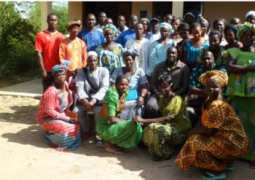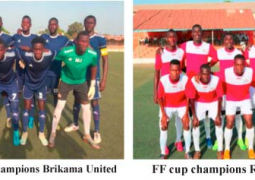Mugabe, leadership and despotism in
'As for our common defense, we reject as false the choice between our safety and our ideals. Our Founding Fathers, faced with perils we can scarcely imagine, drafted a charter to assure the rule of law and the rights of man, a charter expanded by the blood of generations. Those ideals still light the world, and we will not give them up for expedience's sake'. President Barack Obama
Last week the news of the world carried the death of Omar Bongo, the President of Gabon. All the reportage had one thing in common-the length of his Presidency 'the longest serving president in Africa-42 years in all' and his efforts to ensure the smooth succession of his son to the Presidency of Gabon. Bongo is cut from same cloth as Mobutu, Banda, Bokassa, (the BIGMAN or Chef Syndrome). They are characterised by venality, rapacity and extraordinary megalomania. As Africans we are for cultural reasons reluctant to speak of our leaders, especially the newly dead. For this reason the following piece will focus on a living African Leader.
Now the dust has settled in
After 27 years in prison because of his principles against Apartheid, no one would have begrudged Mandela a life-presidency of the new
Having fought against or drove away the white man from their native land, most first generation African leaders got trapped in the vortex of that dubious victory. They came to high offices of State totally unprepared to govern in an accountable manner. In their view they have won independence for their people and therefore they, their families, clan and tribe are entitled as of right to the spoils of victory. Most of the first generation leaders spent their years in office trying to mystify the ordinary people either by impeccable foreign accents or grandiose prefixes to their name.
Those without these kinds of pedigree resorted to ancient African symbolism like carrying a fly whisk or a staff to signify some superhuman attributes. Why they needed and still need to do this to the ordinary people, in whose name they govern and who pay taxes to maintain them in office and whose names are invoked to claim resources needed for national development, to this day beggars belief.
Therefore it was no surprise that within a decade of independence almost all African States had experienced catastrophic violence in the form of military coup d'états or civil wars or both as was the case in
The few leaders who were not caught in that trap and survived the pitfalls of national consciousness and upheavals were truly exceptional men. Senghor of Senegal and Nyerere of Tanzania symbolized to a high degree that generation of leaders, who had a grand and humanistic vision for their people and the peoples of
Both used culture as a narrative to bind their different ethnicities into one nation. Kiswahili as the lingua franca not only of the union between Tanganyika and Zanzibar but also of East Africa, parts of DRC and the Great Lakes States, owed a lot the seminal leadership provided by Mwalimu Nyerere.
Ironically, Robert Gabriel Mugabe belongs to this generation but also had the additional advantage of learning from the mistakes of these great leaders, because he came on the leadership scene nearly two decades after the first glow of Panafricanism. Indeed as he was taking over the reins of power in
Into this maelstrom Mugabe was unleashed: suave and sophisticated Mugabe used his wit and eloquence to cheer and inspire people fighting for freedom in
The point is that Robert Mugabe had within his grasp greatness to rival even that of Mandela's. But incompetence, conceit and delusions of grandeur put greatness out of his reach; Mugabe's complicity in the massacres in
Not that age is a decisive factor in leadership: President Wade of
But at 84 one wonders what Mugabe can offer the people of
The land issue is one area that has polarized people engaged in any serious discussion about Mugabe's stewardship of
And there are those who believe in legal constructions i.e. the land belongs to those who have legal title to it, does not matter how the title was obtained. But lest we forget that the modern State is the biggest legal construction there is, and it thrives and succeeds on the foundation of the rule of law. As such one of the main challenges facing the leadership of African States then and now is how to use the instrumentality of law to achieve socially and economically desirable goals? The power of the law to grant licence for or prohibit certain actions bestows legitimacy on the process of governance. Legitimacy is supremely important for orderly co-existence that is why in a democratic dispensation, it is sought often, through elections which empower the representatives of the people to make laws for their welfare and prosperity.
This means that if a leader has a majority in the law making body, he can do pretty much as he pleases until the next election and the voter has the right to pass judgement on his stewardship; this is how a real democracy functions. Mugabe has had majorities in the Zimbabwe Parliament in more than four consecutive five year terms, but did little or made use of the instrumentality of the law to extend the ownership of land to the black majority. Some have argued that his hands were tied by the terms of the Lancaster House Agreement reached during the negotiations for independence.
This is partially true but there is another truth. It is Mugabe's incompetence. Nationalism does not absolve him of it. Of course incompetence comes from history, from the accumulated opportunities presented to him as a leader for the resolution of the land problem. Take
It is acceptable to keep to an agreement when the terms are working for both parties but it is foolish to preserve an agreement when the other party is perfidious. Whatever the terms of the Lancaster House Agreement are, it was clearly not working in interest of the black majority. And after ten years of independence with the land status quo remaining the same Mugabe would have been justified to use affirmative action to return the land to the people based on legitimate premises to empower the majority.
This was done in
Mugabe and leaders of his ilk are content in the delusion that making anti-colonial tirades or raging and ranting against western values and standards are enough to arouse the people to a high pitch of patriotic fervour and make them forget the poverty and destitution that permanently besmears their lives. There is something alarmingly venal in Mugabe's politics and rhetoric these days he sounds as if
This is indeed a tragic failure of leadership and from one who started so well and who had time and opportunity to build and bequeath a fitting legacy to the people of
Today, millions of Africans live in abject poverty, eking a living for mere existence. Millions are unemployed and underemployed. Millions remain without healthcare and education. Millions are subjected to the indignity of being treated as internally displaced people, refugees or illegal migrants. They have no security. They have no laws to protect them. Where there are laws it is only to protect the rich and powerful. This is the grossest violation of human rights and it is attributable to poor leadership.
What are Africans to make of rulers who say that only they know what is good for the country? That the rest - academics, economists, lawyers, doctors, engineers, teachers, and other members of civil society - are ignorant mortals who know nothing about the dangers facing African countries or how to tackle them? That democracy is not good for Africans? That they know how much the people love them? And that they will know when the time is right for them to step down?
In Africa, men with bogus and spurious credentials, too often pose as leaders and moral guides of the people. All it takes is a certain brashness and a familiarity with the AK-47 for an army sergeant to overturn the constitutional and legitimate order of the state. Always justifying the coup by cataloguing all the ills of the legitimate government such as corruption, nepotism and tribalism as if knowing the symptoms of a disease qualifies one to make credible diagnosis and prescribed an effective therapy.
What goes through the minds of despots and those who hold real power in Africa, as they see the abominable state of affairs of their countries? Clearly they see the situation very differently from the way that the man in the street does. While both may agree that there are serious problems facing the country, despots feel they are the only ones who can save it. They see other points of views as dangerous and subversive, or worst unpatriotic. Clearly, there is something seriously wrong with their thought process.
A despot's thinking is severely restricted and he suffers from selective listening. He has a very narrow vision. He cannot live with dissent. Despots tend to be liberal as long as you agree with them. Any serious opposition and they crush it, never mind the democratic intent. The media is treated like an animal in a zoo - tolerated in confined spaces. The moment it tries to get out, it is firmly put back in the cage. They do not trust anyone beyond a small and close group of people mostly from their tribe who feed them information they want to hear. Their entire perspective is based on this narrow line of information.
And as they near their political demise they become more and more bizarre - both in their thinking and behaviour. We have countless examples of despots and their strange behaviour - Omar Bashir of Sudan, and his neighbour, Idris Debi of Chad but Robert Mugabe of Zimbabwe, takes pole position in eccentricity and is the current poster boy of a grand old man behaving badly.
The theft of sovereign rights of the people of Zimbabwe expressed through the ballot was described as a message for national unity and that Mugabe is President but he should be encouraged to form a government of National Unity with the MDC. Or worst turn the whole thing into a war of words against the 'imperialist west' and that the West is "obsessed with democracy", Mugabe emphasised the travesty of leadership in Africa while at rally for the election where he was the Sole Candidate by throwing the gauntlet thus 'which African head of state dares to point a finger at Robert Mugabe'?
Even a despot's physical appearance is important. Dictators frequently try to look younger than their years. This also contributes to their self-image and ego. Imagine if Mubarak and Mugabe stopped dyeing their hair. White haired, they would look very different and their whole appearance would undergo a drastic change.
Unfortunately, it is almost impossible to change this line of flawed thinking, as despots do not think there is anything wrong with their way of thinking. Hence most are removed - either violently or forced out. This is what history has taught us. Let there be no doubt about it. Those who doubt this need only remember what happened to Charles Taylor and more recently Presidents of Mauritania and Guinea Bissau.
Almami Fanding Taal is Legal Practitioner with special interests in Human Rights, Media Laws, and Good Governance & Institutional Development
Read Other Articles In Article (Archive)
Women as agents of change
Mar 9, 2011, 1:23 PM

GLMA trains pig farmers on meat hygiene, pork processing techniques
Dec 17, 2013, 10:04 AM


